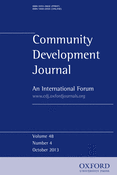-
Views
-
Cite
Cite
Peter Karari, Sean Byrne, Olga Skarlato, Kawser Ahmed, Julie M. Hyde, The role of external economic assistance in nurturing cross-community contact and reconciliation in Northern Ireland and the Border Counties, Community Development Journal, Volume 48, Issue 4, October 2013, Pages 587–604, https://doi.org/10.1093/cdj/bss054
Close - Share Icon Share
Abstract
Protracted ethnopolitical conflicts often emanate from structural violence, and from the vulnerability and marginalization of sections of a community. During the Troubles, Northern Ireland and the Border areas were characterized by an intractable conflict between Nationalists and Unionists. External economic assistance could be a key peacebuilding intervention in facilitating cross-community contacts and reconciliation, thereby addressing historical injustices in Northern Ireland by promoting justice, equality, and dignity. The European Union (EU) Programme for Peace and Reconciliation in Northern Ireland and the Border Region of Ireland, 2007–2013 (EU Peace III) is aimed at promoting reconciliation and in facilitating progress towards the building of a peaceful and stable society. This study examines the perceptions of 120 community group leaders, and community development officers in Derry and the Border Counties about the impact of the International Fund for Ireland (IFI) and the EU Peace III Fund in encouraging cross-community contact and reconciliation between the Nationalist and Unionist communities. While the IFI and the Peace III Fund have successfully promoted cross-community contact and reconciliation in Northern Ireland and the Border Area, this study indicates that both funders' bureaucracy hinders sustainable community development. This study recommends the need to decentralize community peace projects to facilitate community ownership and their sustainability.



